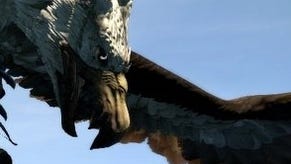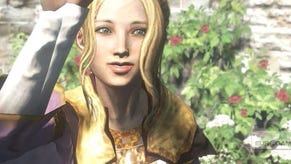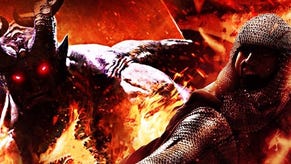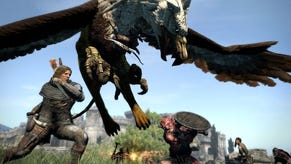Dragon's Dogma wants to surprise you - even if that means winding you up first
Maxim-um potential.
When taken at face value, the review scores and Metacritic reception for Dragon's Dogma look extremely positive. Considering the never-ending discourse surrounding reviewer vs player scores, Dragon's Dogma seems like a strange anomaly. It's a game that everyone agrees is a solid 8 out of 10.
This might fool you into thinking that Dragon's Dogma is a game that everyone will love. In reality, however, I'd hesitate to recommend it to anyone without first warning them of its flaws - because these flaws are almost integral to enjoying Dragon's Dogma. Weird as it sounds, the cult status and dedicated fanbase earned by Dragon's Dogma is owed just as much to its imperfections as its strengths. This piece isn't for the people that loved Dragon's Dogma the first time they encountered it, or for the people that played through it five times and are desperately excited for the sequel. This is for those of you that gave Dragon's Dogma a chance, and gave up halfway through.
Originally released in 2012, Dragon's Dogma immediately drew praise for its satisfying and brisk hack and slash gameplay, as well as its surprisingly deep AI-driven "pawn" system. The opening story tasks players with, quite literally, stealing back their own heart from a Shakespearean dragon - a cool premise that unfortunately gives way to a somewhat forgettable, bloated plot until the plot eventually ramps back up towards the conclusion.
This narrative bell curve is oddly representative of Dragon's Dogma's biggest problem: its middle act. After an enjoyable opening, players will step out into the open world and discover a litany of reasons to promptly give up on Dragon's Dogma. A large, yet sparsely populated map. Constant backtracking across an empty world, paired with a limited fast-travel system. Frequently recycled enemy types, including bosses that respawn mere hours after lengthy fights. Missions with undefined conditions that, when not met, will either make the mission twice as hard or fail it completely. These are all red flags that, when taken on their own, would warn anyone to steer clear.
All of these issues immediately bubble to the surface in unison not long after creating your character and starting out on your adventure. After a couple of hours of genuinely fun tutorialisation, the main questline will guide you towards Gran Soren, Gransys' capital and the biggest city in the game. This is where, unfortunately, most players seem to give up on Dragon's Dogma, and it's easy to see why.
Whilst Dragon's Dogma offers some guidance in the form of a main questline to follow, after reaching Gran Soren it's more than happy to let you explore Gransys in its entirety - at which point you will discover that the open world is mostly barren, save from some very difficult enemy encounters. This might sound like standard fare for some RPGs, but the difference here lies in exactly how much of your time Dragon's Dogma is comfortable wasting. Slow treks across the map, paired with that restrictive fast travel system force you to spend the majority of your time walking from one point to another, with very little in the way of engagement in between this to entertain you.

This might not sound like the most glowing retrospective so far, but it's important to warn you what you're in for. Dragon's Dogma is the rare example of a game I would recommend you actively try to spoil for yourself should you find you're no longer having fun. Because otherwise, without prior knowledge of how certain mechanics work, you may find you never get far enough into the game to understand what it's trying to achieve by brazenly wasting your time.
That first big trek from Gran Soren to your next quest objective is a sluggish, methodical affair. Your entire party is under-leveled, you don't have access to any of your chosen classes' most crucial abilities, and, likely unbeknownst to you, day is about to turn to night, which will cause the game to get even harder due to the stronger enemies that spawn. This is, for better or worse, one long winded lesson in how exactly you are intended to traverse the world of Gransys. The time and effort invested in simply reaching your quest objective is supposed to teach you how to meet the game on its own terms. Leveling up and getting stronger, stocking up on items, and finding specific points on the map to rest so that you can avoid fighting at night will make repeated treks across the map easier and faster.


This unhurried, show-don't-tell mentality to its game design doesn't just apply to exploration, but to almost every facet of Dragon's Dogma's gameplay. Character height and weight have a massive impact on your stats. Rented pawns can break the fourth wall to give you tips on monsters and missions they've completed with their original creator or other players. There's even a hidden romance mechanic that applies to almost every NPC. Dragon's Dogma absolutely does not want to tell you about any of these mechanics because it wants discovering how they work to be a surprise, but while this bold approach can make your first playthrough more interesting, it also makes it more frustrating, so coming into your second playthrough equipped with all this knowledge and breaking the game wide open can be immeasurably more fun.
Any game that takes hours to get to the "good bit" is, by most standards, a failure. Yet Dragon's Dogma is worth playing not in spite of this, but because of it. It's a game that wants to surprise you, regardless of how much of your time it has to sacrifice first. If you've never played Dragon's Dogma, I would still recommend going in completely blind and trying to experience these secrets on your own - with the added caveat that you may have to endure some punishing time wastage as a result. But if you have previously tried and failed to love this game, my advice to you would be simple: cheat. Look up the guides. Min/max your character. Discover every secret mechanic by reading about them online before you discover them in-game. Whilst experiencing the game as the developers intended is undoubtedly still the best way to get the most out of Dragon's Dogma, there's an incredibly fun, unique game to engage with here, and it also some of the most exciting boss fights of the last decade. Everyone deserves a chance to enjoy that, and if that means peeking behind the curtain instead of patiently learning the game's lessons, then peek away.









